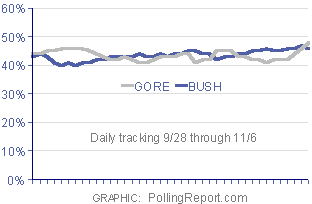
Sometimes strategists say the darndest things. As Dan Balz reports in this morning's Washington Post...
... McCain's team dismisses the most dire polls -- those showing the race nationally with a double-digit lead for Obama. Advisers believe the contest's margin is in the five-to-seven-point range, about the same deficit, they say, that then-Vice President Al Gore faced at this time eight years ago against then-Gov. George W. Bush.
The implication, I suppose, is that because Gore clawed his way back and won a popular vote victory on Election Day, McCain can, too.
This may be true. McCain may still win the the election. It's just that the Bush v. Gore poll numbers don't give us any reason to believe that he will (even if they do make for a nifty talking point).
Here's why. The current RealClear Politics polling average shows Obama leading McCain by 7.8 percentage points nationally (50.3 to 42.5); it includes 15 surveys released between Oct. 19 and Oct. 23. Unfortunately, RCP didn't exist in 2000, so there's no historical average to use for comparison. But we can create our own. Thanks to Polling Report's comprehensive catalog of presidential trial heats, I was able to average together all 25 surveys released between Oct. 19 and Oct 23, 2000. The results? Over that four-day period, Bush led Gore by only 3.5 percentage points (46.1 to 42.6). Two things to notice:
First, while McCain's average level of support (42.5 percent) is nearly identical to Gore's (42.6 percent), the average gap between McCain and Obama (7.8 percent) is twice as large as the average gap between Gore and Bush (3.5 percent). McCain's advisers may "say" that Obama's "five-to-seven-point" lead matches Bush's margin from eight years ago, but facts are stubborn things. The fact here is that McCain now faces a much steeper uphill battle than Gore ever did.
Second--and most importantly--Bush was polling nearly four points under 50 percent on Oct. 23, 2000. Obama, on the other hand, is averaging over 50 percent in the polls. Only three of the 25 surveys released between Oct. 19 and Oct. 23, 2000 show Dubya attracting a majority of supporters; meanwhile, 11 of the last 15 2008 soundings put Obama past the magic 50 percent mark. That's a big difference. To win in 2000, Gore merely had to sway a significant number of undecided voters--which is what ended up happening. But to beat Obama, McCain has to convince people who already say they support the Democrat to jump ship--a much harder task. If the election were held today, polls indicate that Obama would capture a popular-vote majority--even if every single undecided voter sided with McCain. You simply couldn't say the same thing for Bush at this point in the 2000 race (and that's not even accounting for the Electoral College math, which looks far worse for McCain than it did for Gore).
Ultimately, McCain may win. He may lose. But while Gore's 2000 performance has given his strategists a convenient talking point, it shouldn't really give them hope.
Uncommon Knowledge
Newsweek is committed to challenging conventional wisdom and finding connections in the search for common ground.
Newsweek is committed to challenging conventional wisdom and finding connections in the search for common ground.





